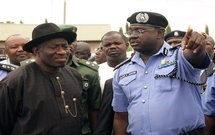 Nigerian President Goodluck Jonathan has set up a committee to explore the feasibility of reaching an amnesty agreement with Islamist militant group Boko Haram. The Jonathan administration has launched previous bids to halt Boko Haram's almost daily attacks on soft targets in northern Nigeria, but to no avail. Many barriers remain to negotiating with Boko Haram, putting the success of the government's most recent overtures in doubt.
Nigerian President Goodluck Jonathan has set up a committee to explore the feasibility of reaching an amnesty agreement with Islamist militant group Boko Haram. The Jonathan administration has launched previous bids to halt Boko Haram's almost daily attacks on soft targets in northern Nigeria, but to no avail. Many barriers remain to negotiating with Boko Haram, putting the success of the government's most recent overtures in doubt.
Jonathan made clear in March that there would be no amnesty deal until Boko Haram is willing to negotiate directly rather than through intermediaries. However, Boko Haram is not a monolithic entity but a decentralized network of militants with tensions between factions. On several occasions people who have claimed to represent Boko Haram have announced they will negotiate, only to be killed by more extreme members of the group. The group's cell-like structure thus makes negotiations difficult, even if such negotiations involve top Boko Haram leader Abubakar Shekau.
Additionally, Boko Haram is not the only militant group in northern Nigeria. Another jihadist group with stronger ties to al Qaeda in the Islamic Maghreb known as Ansaru has emerged. Ansaru has actively targeted foreign nationals for kidnapping as part of its transnationalist ideology. If Abuja strikes a deal with Boko Haram's nationalist factions, those concessions will not deter Ansaru from further attacks. (It is worth noting that jihadist groups are not responsible for all the violence in northern Nigeria, and in fact, most of the violence in some northern cities such as Jos results from clashes between ethnic groups -- such as the Muslim Fulani and the Christian Berom -- over land and cattle.)
Complicating matters, Boko Haram is not concerned solely with spreading Islamist tenets but is also a political tool. Northern politicians use Boko Haram's violence as cover to conduct their own assassination attempts. Instances of direct support from prominent ethnic Kanuri politicians for Boko Haram -- primarily a Kanuri-based insurgency -- have been uncovered.
Boko Haram does not enjoy widespread support from all ethnic groups in the north. Violence -- often carried out by Boko Haram -- does exist in non-Kanuri regions in the north, such as Kano, but no groups like Boko Haram have emerged representing the region's other ethnic groups.
Jonathan may take comfort in his ability to orchestrate an amnesty and demobilization plan with Niger Delta militants in 2009. However, that effort succeeded because Jonathan brought his personal connections to the delta to the table. He was intimately connected with the militancy campaign. He knew the militant commanders personally and the region's political elite. Jonathan also oversaw the disbursement of upward of a billion dollars to support the Niger Delta amnesty program. In terms of Boko Haram and northern Nigeria, Jonathan is dealing with political enemies who are not content with mere welfare and with whom he lacks personal connections. Further undermining his efforts, many northerners feel it is their turn to assume the presidency in 2015, and some will resort to militancy to bolster this demand.
Jonathan could negotiate with northern politicians who incite violence, but to offer something to them, he must take something away from another group, which in turn could spark violence in another part of Nigeria. This sort of zero-sum ethnic-balancing restricts political moves in Nigeria.
Just what Jonathan could offer the militants other than amnesty also remains unclear. There is no employment program in place that he could use to entice northern militants to lay down their arms, and since Boko Haram's violence does not threaten vital commercial operations, there is little incentive to create one either. However, should someone culturally closer to Boko Haram and its supporters -- such as a Muslim northerner -- assume the presidency, a successful amnesty program would become easier to achieve.
Courtesy : Stratfor (www.stratfor.com)